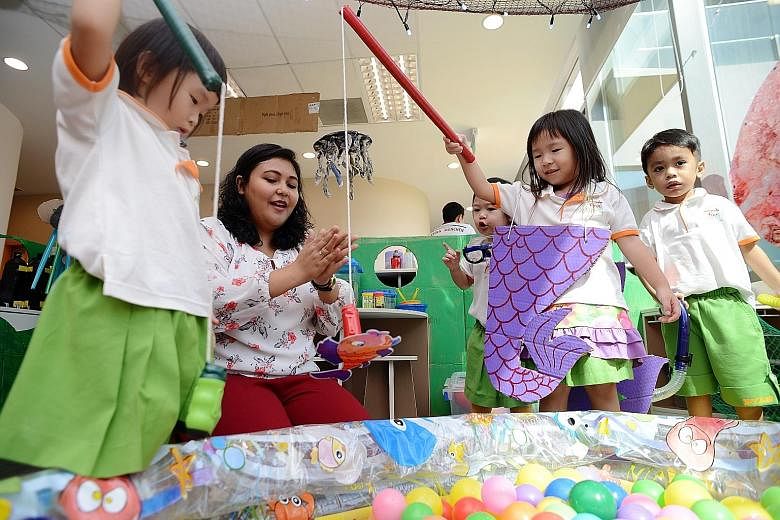Infants and toddlers will get more personal care at one of the largest pre-school operators here, as part of a curriculum overhaul at NTUC First Campus.
The operator, which has about 6,000 infants and toddlers in 138 childcare centres, will now allocate one teacher to every two to three infants, instead of having a few teachers collectively take care of 12 to 15 children - the industry norm.
The move, which will not change the teacher-student ratio, is prompted by a study by the Lien Foundation which found that having one teacher dedicated to every two to three infants is better than the previous arrangement.
The study found that children cared for by one main teacher are happier and more independent compared to those who go through the more regimented approach.
Past research has shown that strong bonding with an adult is crucial in a child's development, especially in the first three years when their brain connections are being formed.
The findings come at a time when more parents are enrolling their children in childcare centres at a younger age. NTUC First Campus said the number of children aged three and below enrolled full-time in childcare centres in Singapore is estimated to have grown by 50 per cent over the last six years, from 20,000 in 2009 to over 30,000 last year.
The high turnover rate in the industry, however, means children in childcare centres may be exposed to many new faces as teachers change every three to six months.
The study, which was funded by Lien Foundation and carried out by the Seed Institute, involved 130 children. Half the children were put through the new approach in which a teacher tends closely to the needs and interests of two or three infants, which dictate the activities of the day. The other group continued the old method, in which the class of 15 follows a fixed schedule - for example, a water-based activity in the morning. There were clear differences between the two groups in the children's well-being and levels of involvement.
Now, if the teacher observes that a certain child is not interested in that activity, that individual or small group will break away to do something else, say finger painting.
"There will be less herding behaviour where children are just marched around to do this and do that," said Professor Marjory Ebbeck, director of the Centre for Research and Best Practices at the National Trades Union Congress' (NTUC) Seed Institute. The institute runs diploma and degree courses in early childhood education.
Even before this, a smaller-scale study emphasised the role of primary caregivers in helping children to be independent and resilient. Some children who interact with many adults at the same time experience difficulties forming secure relationships.
The new curriculum was introduced to some pre-schoolers at all of its centres earlier this year and the rest will come on board by next year. Curriculum for this age group is relatively underdeveloped as the sector has focused on the four-to-six age group, said chief executive of NTUC First Campus Chan Tee Seng.
Said Mr Lee Poh Wah, chief executive of Lien Foundation: "This is a paradox because studies show that children between the ages of zero and three are in the most formative phase of their lives."
Ms Phyllis Chew, 28, mother of two-year-old Camille who tried out the new curriculum, said she has started to see positive changes in her daughter's behaviour.
"She is obviously enjoying the lessons more now as she puts on her school uniform eagerly each morning and has conquered her fear of water," said Ms Chew. "And it boils down to having a teacher interacting and communicating more with her so that she becomes confident enough to express herself."


